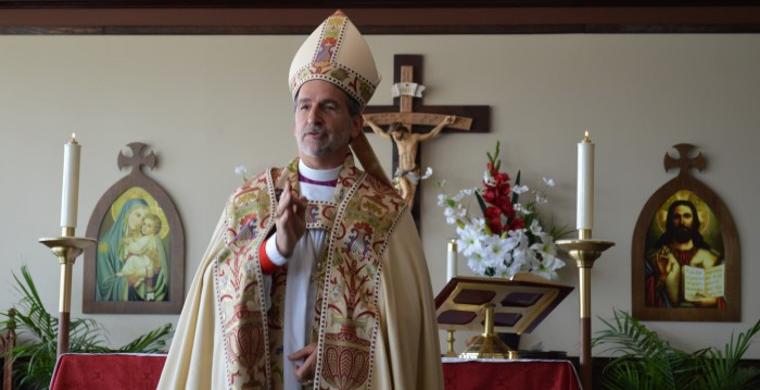Practical Ecclesiology in a Time of Subverted Institutions
By Rob Scovell
Special to Virtueonline
www.virtueonline.org
May 15, 2019
In the last 50 years, the two main hierarchical communions of the western Church have
experienced subversion by Leftist infiltrators, resulting in major discontinuities with the past.
Rome was the first to fall: the reforms of Vatican II created a new ecclesial body with the
same name but with a new and very different nature. We have now come to a point at which
if you were to ask, "Is the Pope Catholic?" you might well get the answer, "Hmmm I'm not
sure ...".
The Vatican II discontinuity led to the formation of traditionalist Catholic groups named after
different popes who took the papal name 'Pius'.
Provinces of the Anglican Communion have moved along a path of slowly widening
discontinuity with the past. At each stage, traditionalist Anglican groups have split off.
The Eastern churches, since the October Revolution in 1916, have set up competing and
conflicting jurisdictions for the refugee diaspora and their descendants. While they have not
been subverted theologically, the jurisdictional bickering, and the effective phyletism it
represents, is a very grave problem indeed.
The effect of the subversion of the main hierarchical communions is twofold:
● The institutions of the communions have diverged radically from their definitional
documents. That is, you can no longer form an understanding of the institution from
reading the foundational documents of the pre-subversion institutions. For example,
the 39 Articles no longer describe the theology of the Church of England.
● There is a plethora of bishops claiming continuity from the pre-subversion
communions. In the words of one VirtueOnline commenter, there are parts of the
world where you can hardly swing a censer without hitting a bishop with a cathedral
in his garage!
As Bishop Gavin Ashenden has pointed out in his most recent Anglican Unscripted podcast,
history is accelerating. The chaos is growing. The level of ecclesiological subversion is such
that it leaves orthodox laity and clergy unshepherded. It is no wonder that the sheep are
scattering.
Episcopal orthodoxy, accountability and responsibility are essential elements in the life of the
Church.
At a time like this, laity and clergy need a practical ecclesiology.
In some places, such as areas with a strong ACNA presence, it will be easy, but there are
huge swathes of spiritual wasteland in the western world these days.
A practical ecclesiology recognises the following factors:
● The breakdown of the major institutions has reached a chronic state
● The orthodoxy and ecclesial authority of a bishop can no longer be deduced from his
institutional membership or allegiance
● The nature of an institution can no longer be deduced from its foundational
documents or confessions
● Bishops in traditionalist/continuing Anglican bodies often blur the lines between
Anglican, Catholic and Orthodox practice, as a result of seeking to be true to
pre-Schism apostolic faith and practice.
● Some traditionalist/continuing bishops oversee active parishes while others operate
alone, leading to the 'cathedral in a garage' scenario.
● 'Sola Scriptura' is not a quick answer: there is no church body that entirely rejects
Scripture. It is important to know that the Scriptures have always been interpreted
consensually and there are bodies that proclaim 'Sola Scriptura' while adopting false
teaching based on heterodox or flawed interpretations.
I suggest that a practical ecclesiology for a confused layperson or clergyman should look like
this:
● Avoid the temptation of congregationalism: don't take refuge in a group that has no
effective episcopal accountability or oversight. These groups usually end up heavily
stamped with the ego of the presiding minister and can be pastorally unsafe. The
theological state of the non-episcopalian denominations is worse even than that of
the major communions.
● Find out and scrutinise the bishop of every competing jurisdiction in your area.
● Eliminate from your list any that encourage phyletism (i.e. a heavy and exclusive
ethnic preference). You will feel pressure to modify innocent cultural practices.
● Eliminate from your list any that serve alone, with no parishes.
● Eliminate any who seem to have separated due to eccentricity rather than a desire
for orthodoxy, or who seem to wish to stamp their own ego on a small organisation.
● Spend time getting to know the parishes under the bishops that remain on your list.
● Prayerfully commit yourself long-term to a parish that is under an orthodox bishop
who understands and takes his shepherding responsibilities seriously. These
parishes need all the support they can get.
● Expect to make a serious commitment.
● Do not become too wedded to the particular institutional body the bishop is a
member of: remember the aim is to solve your personal ecclesiological problem, not
to reinforce the chaos.
I have followed this path through necessity. Allegiance to a communion is now no longer a
possibility, so allegiance to a carefully and prayerfully chosen bishop has become
necessary.
Rob grew up in the Church of England in the days of hymns such as To be a Pilgrim,
and I vow to thee my Country. He has a BD from Edinburgh University and now lives and
works in New Zealand as an software engineer.














